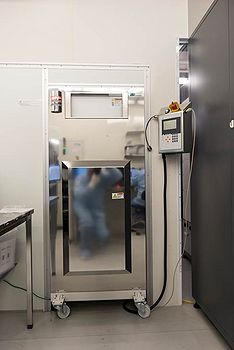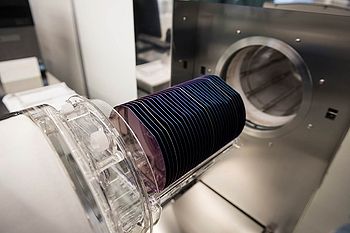Specific Process Knowledge/Thermal Process/Furnace: Multipurpose annealing: Difference between revisions
| Line 19: | Line 19: | ||
Is is possible to change all quartz ware in the furnace (the furnace tube, the door sealing and the wafer boat). A the moment we have two different sets of quartz ware - One that is dedicated for resist pyrolysis, and one that is dedicated for annealing of oxidation of different sample, e.g. samples with metals. The quartz ware is normally changed once a week. | Is is possible to change all quartz ware in the furnace (the furnace tube, the door sealing and the wafer boat). A the moment we have two different sets of quartz ware - One that is dedicated for resist pyrolysis, and one that is dedicated for annealing of oxidation of different sample, e.g. samples with metals. The quartz ware is normally changed once a week. | ||
The furnace tube is heated by use on 12 long heaters | The furnace tube is heated by use on 12 long heaters situated along the furnace tube and two flat heaters situated in the ends of the furnace tube. The this way the temperature will be very uniform everywhere in the furnace tube. The heating can be done very fast, up to 30 <sup>o</sup>C/min. For atmospheric pressure processes the maximum temperature is 1100 <sup>o</sup>C, and for vacuum processes the maximum temperature is 1050 <sup>o</sup>C. | ||
For resist pyrolysis, where samples with different resist layers are heated up to maximum 1100 <sup>o</sup>C in a nitrogen atmosphere. At high temperatures carbon is formed by pyrolysis of the resist. In this way conductive structures can be made from a resist patterned sample. If oxygen from the air or from outgassing of the resist is present in the furnace, the resist layer will be removed, thus it is important to evacuate the furnace and flush it with nitrogen, before a high temperature for resist pyrolysis is obtained. Pyrolysis of a large amount of resist may also be a problem due to resist outgassing. | For resist pyrolysis, where samples with different resist layers are heated up to maximum 1100 <sup>o</sup>C in a nitrogen atmosphere. At high temperatures carbon is formed by pyrolysis of the resist. In this way conductive structures can be made from a resist patterned sample. If oxygen from the air or from outgassing of the resist is present in the furnace, the resist layer will be removed, thus it is important to evacuate the furnace and flush it with nitrogen, before a high temperature for resist pyrolysis is obtained. Pyrolysis of a large amount of resist may also be a problem due to resist outgassing. | ||
Revision as of 11:05, 5 August 2015
THIS PAGE IS UNDER CONSTRUCTION
Multipurpose annealing furnace
Feedback to this page: click here
The ATV Furnace


The purpose of the ATV Furnace is annealing and oxidation of different samples and resist pyrolysis. Annealling and resist pyrolysis can be done in vaccum or at atmospheric pressure, in a N2 , H2 or a mixture of the two gasses.
Is is possible to change all quartz ware in the furnace (the furnace tube, the door sealing and the wafer boat). A the moment we have two different sets of quartz ware - One that is dedicated for resist pyrolysis, and one that is dedicated for annealing of oxidation of different sample, e.g. samples with metals. The quartz ware is normally changed once a week.
The furnace tube is heated by use on 12 long heaters situated along the furnace tube and two flat heaters situated in the ends of the furnace tube. The this way the temperature will be very uniform everywhere in the furnace tube. The heating can be done very fast, up to 30 oC/min. For atmospheric pressure processes the maximum temperature is 1100 oC, and for vacuum processes the maximum temperature is 1050 oC.
For resist pyrolysis, where samples with different resist layers are heated up to maximum 1100 oC in a nitrogen atmosphere. At high temperatures carbon is formed by pyrolysis of the resist. In this way conductive structures can be made from a resist patterned sample. If oxygen from the air or from outgassing of the resist is present in the furnace, the resist layer will be removed, thus it is important to evacuate the furnace and flush it with nitrogen, before a high temperature for resist pyrolysis is obtained. Pyrolysis of a large amount of resist may also be a problem due to resist outgassing.
During processing the furnace is rapidly heated by use of six long heating lamps situated around the furnace tube, and cooling is done (rather slowly) by use of cooling fans. The furnace is purged with a controlable nitrogen flow. There is no vacuum on the furnace.
The ATV Furnace was installed in the cleanroom in 2014.
The user manual, technical information and contact information can be found in LabManager:
Process information
| Purpose |
| |
|---|---|---|
| Performance | Film thickness |
|
| Process parameter range | Process Temperature |
|
| Process pressure |
| |
| Gasses on the system |
| |
| Substrates | Batch size |
|
| Substrate materials allowed |
|
